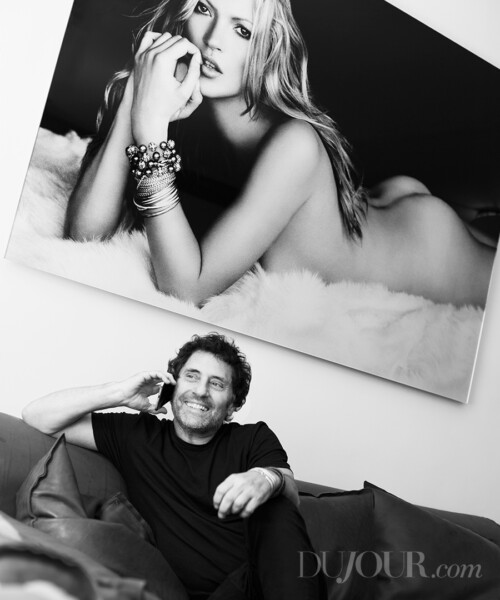On Friday, September 25, 2013, the day after his namesake advertising agency abruptly filed for bankruptcy, David Lipman returned to the company’s 22,000-square-foot headquarters in New York’s Meatpacking District to sort out paperwork with his accountants. As Lipman tells it, he was exiting the office when a white van pulled up in front of the building. A man—whom Lipman says he did not recognize—sprang from the passenger’s seat holding a two-by-four. He proceeded to clock Lipman over the head with the piece of wood.
“I went down, and he started kicking me and calling me names,” recalls Lipman, who bears a large scar across his right cheek from the incident. “Then he jumped back into the van and drove away.”
Lipman never bothered to file a police report: The notion that someone might be out to get him did not exactly come as a shock. His agency owed a lot of people a lot of money, and they weren’t just angry—they were out for blood.
It’s been two years since the Lipman agency shuttered seemingly overnight, leaving stunned employees without jobs, A-list clients like David Yurman and Stuart Weitzman with unfinished campaigns and top talent—including Kate Moss and photographer Mario Testino—with millions in owed money. People said Lipman would never work again and there was a time when Lipman himself might have agreed. Now, though, he’s fighting to make a comeback.
One could argue that Lipman was born to be an ad man. His grandfather, Herb Lipman, founded the Lipman agency in 1927 before passing the company on to David’s father, Robert, in the late 1940s. Lipman spent most of his twenties working for the global advertising agency Bozell & Jacobs, but later decided to join his family’s more modest firm, which was then creating campaigns for resorts in the Catskills.
“That world died in front of us,” says Lipman. But he was less defeated than motivated. He set out to save the family name, though the way he tells it, there was no strategy or plan—“it just happened.”
Soon, the Lipman agency was working with talent like Cindy Crawford and Linda Evangelista—then up-and-coming models—on ads that garnered quick attention. Former Burberry chairman Victor Barnett was so impressed by Lipman after a brief phone call that he hired him 24 hours later; the brand became Lipman’s first international client. Over the next 15 years, he turned his father’s humble agency into one with luxury accounts and international cache—replacing run-down hotels with Harry Winston, Yonkers Raceway with Mercedes.

A 2007 ad for St. John shot by Mario Testino
From the late ’90s to the early 2000s, the Lipman agency was considered a major player in the luxury-advertising landscape, and Lipman the creative force that every brand wanted. He was shooting campaigns with Angelina Jolie for St. John, directing Smartwater ads with Jennifer Aniston and was even hired as a creative director on Justin Timberlake’s debut solo album, Justified. Images from these projects, among others, now cover the walls of his East Village townhouse.

Lipman served as creative director for Justin Timberlake’s debut solo album
“The first time I saw what he was doing I was blown away,” says Tommy Hilfiger, who met Lipman in the early aughts and eventually hired him for several campaigns. “He chooses the right photographs, the right lighting, the right setting, the right models. David is incredible at doing sexy, sensuous and eccentric advertising.” Another early client, jeweler David Yurman, hired Lipman in 2000 just as the brand was taking off. “We needed somebody with an eclectic, emotional point of view,” says co-founder Sybil Yurman. “[His ads] represented an emotion and a tone and a resonance that gave you the feeling of who we were. It accomplished everything I was hoping for.”
But when the economy took a turn for the worse in 2008, the Lipman agency started to struggle financially. Through a friend, he was introduced to Andrew Spellman, a former Goldman Sachs executive, and enlisted him to handle the books. Spellman became CEO and the Lipman agency began operating under Spellman’s holding company, Revolate, with operations overseen by a seven-person board. “I willingly gave it away with a smile on my face. I said, ‘Let me have creative control. You have business control,’” explains Lipman, who handed over to Spellman and other investors a 68 percent stake in the company, keeping 32 percent for himself.
That first year, he says, “was glorious. We went back to doing business the way we were doing it pre-recession.” The company began to expand at a rapid-fire pace, opening a digital agency, a celebrity-partnership company and a private-equity division—though none, says Lipman, were bringing in revenue. Instead, the new departments were draining the company of cash, with money that didn’t exist going toward pricey hires and rent. Lipman didn’t necessarily object. “I think we all sort of got drunk with the idea that it was easy,” he says. “And nothing is easy.”








































